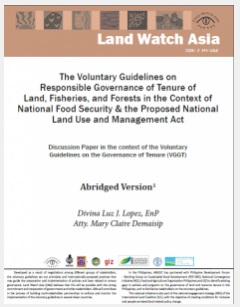Focal point
Location
Founded in 1979, ANGOC is a regional association of 20 national and regional networks of non-government organizations (NGO) in Asia actively engaged in food security, agrarian reform, sustainable agriculture, participatory governance and rural development. ANGOC member networks and partners work in 14 Asian countries with an effective reach of some 3,000 NGOs and community-based organizations (CBOs). ANGOC actively engages in joint field programs and policy debates with national governments, intergovernmental organizations (IGOs), and international financial institutions (IFIs).
Mission & Vision:
The organisation's mission is to create a policy and social environment that enables Asian Rural Poor Communities to exercise their rights to participatory development, gain access to and control of their natural resources, and engage in sustainable livelihoods while drawing from Asia’s rich spiritual and cultural traditions. ANGOC envisions vibrant Asian rural communities living in harmony with nature as stewards of the Earth, whose members are able to realize their full human potentials, collectively chart their path to development, provide for their present and future needs, and equitably share the fruits of their labors in community celebrations of life.
Resources
Displaying 71 - 75 of 1022014 CSO Land Reform Monitoring: Towards an Accountable Governance on Land in Asia
This publication is a collection of 2014 CSO land reform monitoring reports on the status of land tenure and access to land from seven Asian countries (Bangladesh, Cambodia, India, Indonesia, Nepal, Pakistan, and the Philippines). The book also reflects the recent expansion of the monitoring initiative to a ridge-to-reef framework providing a more holistic approach in addressing ancestral lands, rural lands, and marine resource concerns.
2014 CSO Land Reform Monitoring: Towards an Accountable Governance on Land in Asia
This publication is a collection of 2014 CSO land reform monitoring reports on the status of land tenure and access to land from seven Asian countries (Bangladesh, Cambodia, India, Indonesia, Nepal, Pakistan, and the Philippines). The book also reflects the recent expansion of the monitoring initiative to a ridge-to-reef framework providing a more holistic approach in addressing ancestral lands, rural lands, and marine resource concerns.
Enhancing Land Reform Monitoring Effectiveness: A Toolkit for CSOs
This framework aims to help civil society organisations to monitor land reforms. It identifies indicators on outcomes on land tenure and access to land that will help CSOs critically examine whether the rural poor’s land tenure is more secure, and whether their access to land has been enhanced.
The Voluntary Guidelines on the Governance of Tenure of Land, Fisheries, and Forests in the context of National Food Security (VGGT) and the Proposed National Land Use and Management Act (NLUA)
This issue brief is an abridged version of the VGGT discussion paper, “The Voluntary Guidelines on the Governance of Tenure of Land, Fisheries, and Forests in the context of National Food Security (VGGT) and the Proposed National Land Use and Management Act (NLUA)” that analyzes to what extent the salient principles and recommendations of the VGGT are substantially reflected in the National Land Use Act/NLUA (House Bill 108).
LOK NITI Land Grab: the struggle continues
This publication compiles land grab cases documented by LWA partners in Bangladesh, Cambodia, India, Indonesia, Nepal, Pakistan, and Philippines. The cases highlight how farmers, women, and indigenous peoples have been displaced from their lands; and how ecosystems have been destroyed, food security undermined and livelihoods lost. This publication also features the recommended principles of responsible agricultural investment (rai) governing land investments in the Philippines recognizing the importance of farming and fishing communities in the country.






